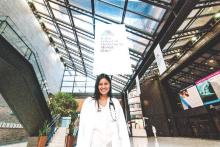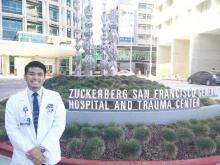Growing up, Denisse Rojas Marquez rarely visited the doctor. As undocumented immigrants from Mexico, her family viewed medical care as a luxury and sought it only in emergencies.
“I would always wait until it was very severe to see a doctor,” said Ms. Rojas Marquez, who came to the United States as a toddler. “That’s still a mentality I have to train myself out of. Growing up, going to the doctor meant very expensive bills and navigating through very complex systems.”
The video associated with this article is no longer available on this site. Please view all of our videos on the MDedge YouTube channel.
At 26, Ms. Rojas Marquez is determined to become a physician and help bridge the gap between undocumented immigrants and medical care. She is close to making that dream a reality because of a 2012 policy called the Deferred Action for Childhood Arrivals (DACA), which protects undocumented immigrants brought to the United States as children from deportation and offers access to work authorization. The policy enabled Ms. Rojas Marquez to become one of the first undocumented students to attend the Icahn School of Medicine at Mount Sinai in New York.
But the fate of Ms. Rojas Marquez’s medical education is in flux as the U.S. Supreme Court considers protections for undocumented immigrants in the case of Texas v. United States. In dispute is the constitutionality of two of President Obama’s immigration policies: the Deferred Action for Parents of Americans and Lawful Permanent Residents (DAPA) and expanded DACA. The former protects undocumented immigrants who are parents of U.S. citizens from deportation, if they meet certain criteria. The second extends work authorization under the original DACA program from 2 years to 3 years and broadens age requirements.
Texas and 25 other states have sued over the programs, arguing the president does not have the authority to issue the new immigration policies, and that the programs violate the Constitution as well as the Administrative Procedure Act for notice-and-comment rule making. High court justices heard oral arguments April 18.
The ruling could impact the growing number of medical students with DACA status across the country, and jeopardize the funding invested in their training. Sixty-one medical schools now accept applications from DACA applicants, according to data from the Association of American Medical Colleges (AAMC). In 2015, 46 students with DACA status applied to U.S. medical schools and 20 were enrolled. In 2016, more than double (112) applied, although enrollment data will not be available until year’s end. Neither AAMC nor the National Resident Matching Program collect data on residents with DACA status.
A high court ruling in favor of the states could lead to DACA’s undoing, said Michael M. Hethmon, an attorney for the Immigration Reform Law Institute in Washington, D.C. The institute issued a brief to the Supreme Court in support of Texas.
If Texas prevails, “it’ll be a matter of weeks before a similar challenge will be levied against DACA and a number of other related programs,” Mr. Hethmon said in an interview. “There will be no more legal justification for those programs that exist.”
Saving talent or wasting money?
Loyola University in Chicago has accepted more students with DACA status than any other U.S. medical school. The reasons are simple, said Mark Kuczewski, Ph.D., chair of medical education at Loyola’s Stritch School of Medicine.
“We’re in the business of taking outstanding students,” Dr. Kuczewski said in an interview. “If the student is outstanding, we want them in our applicant pool. Second, being bilingual and bicultural is extremely important. We have patient populations out there that are diverse and underserved. We want to utilize this talent.”
In the fall of 2014, Stritch enrolled seven medical students with DACA status; in 2014, they doubled that enrollment. The students competed on the same playing field as other applicants and received no special treatment, Dr. Kuczewski said.
DACA students do pose funding challenges, he acknowledged. Although the students are protected from deportation and receive work authorization, they don’t qualify for federal student loans. Medical schools must find unique ways to help DACA students finance their education. A major Catholic health system provides student loan packages for several DACA students at Stritch, Dr. Kuczewski said. DACA students can also apply for financial assistance through an AAMC assistance program.




